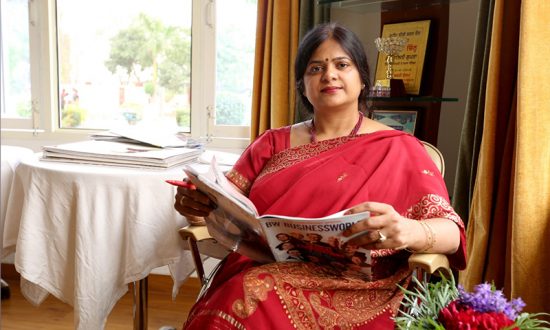The higher education sector is at an inflexion point. It needs to find more effective, efficient ways to educate students without sacrificing rigour or the human interactions and feedback that lie at the heart of quality education. And it needs to do this while somehow covering the escalating costs of financial aid, student services, technology, and compliance with government mandates. There is a serious need to shift on how students are being educated. “Students’ emotional quotient needs to be tapped, along with their behavioural skills. The New Education Policy lays emphasis on the development of creative skills, cognitive capacities like critical thinking, problem-solving, social, ethical and emotional capacities and disposition,” points out Dr Shalini Gupta, Vice-Chancellor, Desh Bhagat University.
An Educator by Blood
Being brought up in a family of educationist parents, Dr Shalini draws her inspiration, vision and futuristic approach from them. Her multidimensional personality is an example of the environment she received during her formative years when she could learn about art, music, reading and other extra-curricular activities. She could learn the traits of honesty, integrity, dedication subconsciously by taking her parents as role models. A doting mother and a house-maker, Dr Shalini is able to manage work-life issues.
With a Doctorate in Entrepreneurship and Masters in Business Administration, Dr Shalini did superbly in her academics as well as extra-curricular activities. With a rich experience of around 27 years in academia, administration, industry entrepreneurial mentoring and research, she has contributed to the education field a lot. Her innovative approach and close association with industry has resulted in the development of students and institution. Dr Shalini says, “We should always strive towards achieving our goal with grit and determination. It is always a series of decisions, challenges, opportunities, failures and finally learning from them that a person reaches where the world sees them as a result.”

Scaling heights with her team
As a young and dynamic leader, Dr Shalini develops strong relationships built on trust and integrity. Believing in participative decision making, she believes in her people and is empathetic towards them. Dr Shalini takes her team along with her as she grows. She motivates and powers and takes them in her fold which has helped her build a great team. Her style of motivating her team members is through mentoring and counselling. She focuses on one’s strengths and finally empowers them.
As a leader, Dr Shalini feels qualities like integrity, honesty, professional ethics, and empathy are inherent, which makes her a role model for everyone around her. Constantly working and upgrading the university in all aspects, she strives to enhance the research quality and academics and creates an environment of innovation and entrepreneurship.
Dr Shalini believes in empowering women and creating opportunities for those in difficulty due to gender bias, domestic violence, or the underprivileged. She has tried to create a movement of creating entrepreneurs from drop-outs, underprivileged, students and women. Her passion for mentoring them has made them capable of earning their livelihood and standing on their feet. Dr Shalini shares, “I feel grateful and content that I could make a positive impact in about 100 womens’ lives by guiding, encouraging and mentoring them. Today, many of them are successfully running their small businesses.”
Though Dr Shalini is a recipient of various awards at state and national level including Lifetime Achievement Award conferred by then Punjab Chief Minister S. Prakash Singh Badal Ji for her exceptional contribution in the field of education in 2014, she considers that the faith that people put in her as a friend, colleague and mentor is one of her biggest achievements. She says, “All this has been possible with the team effort and unconditional support of my management throughout my journey of 21 years at Desh Bhagat University.”
In India, women have often been limited in their roles due to socio-cultural constraints, including politicisation, rigid social norms, and expectations prioritising family over career. Complexity in the social structure and a heterogeneous population of more than a billion varying in culture and religion have made it difficult for governments and institutions to implement policies that are inclusive and not gendered. “If you are looking to grow, then you have to be emotionally intelligent. Believe in yourself as you are born leaders. You can cross any obstacle with your Can-Do Attitude,” opines Dr Shalini.




